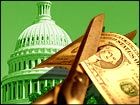
NEW YORK (Tribune Media Services) - Businesses may be the main beneficiaries of the economic-stimulus package that was recently signed into law by President Bush. But millions of individuals will also find some valuable tax benefits in the "Job Creation and Worker Assistance Act of 2002."
Most of the new law provisions become effective in 2002. But a few benefits, including accelerated write-offs for business equipment, were made retroactive to the 2001 tax year, which will affect 2001 tax returns that are being filed this tax season.
Teachers: School teachers who use their own money to buy classroom materials get a new tax break.
In the past, most teachers wound up without any tax break for such out-of-pocket expenses because job-related costs are treated as "miscellaneous" itemized expenses, which are deductible only to the extent they exceed 2 percent of adjusted gross income. Under the new law, elementary and high-school teachers will be allowed to deduct up to $250 of supplies they buy for their classroom each year without having to itemize deductions.
Eligible expenses include books, supplies, equipment, computer hardware and software. The legislation authorizes the deduction only for 2002 and 2003.
Alternative minimum tax: The new law extends a long list of temporary tax breaks that recently expired or were scheduled to expire this year. For individuals, the most important is a provision that protects most personal tax credits, including the dependent-care credit and the Hope and Lifetime college tuition credits, from being reduced by the alternative minimum tax. The provision, which expired at the end of 2001, was extended by the new law through the end of 2003.

Medical savings accounts: The legislation extends the pilot program for tax-sheltered Medical Savings Accounts through the end of 2003. The program was scheduled to expire at the end of this year. Contributions to MSAs are deductible and withdrawals are tax-free when used to pay eligible medical expenses.
President Bush and congressional Republicans are hoping to expand MSAs in future legislation and make them more widely available. Currently, MSAs can be used only by self-employed workers and employees of small businesses (employing no more than 50 workers) who are covered by high-deductible health insurance plans. Medicare recipients are also eligible under certain circumstances.
"Catch-up" retirement contributions: Beginning this year, the Tax Relief Act of 2001 allows workers age 50 and over to make contributions beyond the normal limits to 401(k)s and similar employer retirement plans. The economic stimulus bill allows individuals to start making these extra "catch-up" contributions at the beginning of the year in which they're scheduled to reach age 50.
You don't have to wait until your birthday. For example, if your 50th birthday is Oct. 1, 2003, you'll be able to start making catch-up contributions to your 401(k) in January 2003.
SEP plans: The new law fixes a technical mistake in the 2001 tax act to reflect Congress' intent to increase the annual contribution limit for Simplified Employee Pension (SEP) plans. As a result, the contribution limit for 2002 jumps from 15 percent to 25 percent of compensation, up to a maximum deposit of $40,000.
Business equipment: In an effort to stimulate business investment, the new law allows businesses to write off more of their equipment purchases in the first year. Specifically, businesses are eligible to claim an additional first-year depreciation deduction equal to 30 percent of the cost of the equipment. This "bonus depreciation" applies to most types of business property -- except for real estate -- purchased between Sept. 11, 2001 and Sept. 10, 2004.
To enable businesses to reap the benefit of bonus depreciation for new purchases of cars, the new law temporarily boosts the special ceiling on first-year depreciation for passenger autos from $3,060 to $7,660.
Because the bonus depreciation provision was made retroactive to Sept. 11, 2001, many businesses that bought equipment late last year will be eligible to claim extra deductions on their 2001 tax returns. Those who already filed their returns will be able to take advantage of the new law benefit by filing an amended return.
| |
 Related Links
Related Links
| |
| | |
| | |
|
Self-employed individuals who buy only relatively small amounts of business equipment each year may find the bonus-depreciation provision to be of little benefit. That's because a longstanding provision in the tax code, called first-year expensing, allows smaller businesses to fully write off up to $24,000 a year in equipment purchases without having to depreciate the costs over a period of years.
Form 1099: The new law will allow banks, brokers and other issuers of Form 1099 information reports to send the year-end tax statements electronically if the recipient consents. So expect your financial institution to be asking for your permission to send your 1099 online next tax season. Issuers have been forced to send the statements by mail because the law didn't allow for online distribution.
Education breaks: The new law makes clear that beginning this year, families are no longer automatically disqualified from claiming the Hope or Lifetime college tuition credit for a student in the same year that money is withdrawn from the student's education savings account (formerly known as education IRAs.) The one proviso is that education savings account withdrawals can't be used for the same expenses for which the Hope or Lifetime credit is claimed.

|

